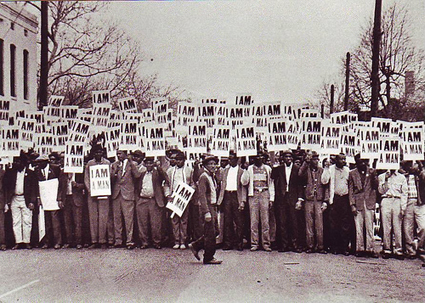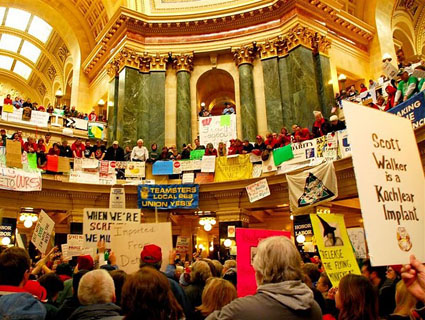
Sanitation workers protested in Memphis 43 years ago.<a href="http://www.flickr.com/photos/tellmewhat/2679891916/">tellmewhat2</a>/Flickr
This week’s labor battles came from all over the country, with protests timed around the centennial of the Triangle Shirtwaist Factory Fire. The March 1911 fire at the Triangle Shirtwaist Factory killed 146 garment workers operating in unsafe working conditions and prompted improvements in worker rights.
Last Monday on the 4th, Oakland and San Francisco dock workers shut down Bay Area ports for 24 hours. Also that day, protestors in Madison, Wisconsin, dressed as zombies demanded “Brains!” from Governor Walker. In Connecticut, firefighters protested benefit and pension scale-backs; Vermont bus drivers picketed; and Pennsylvania news workers protested at the Erie Times-News office.
Organizers report thousands of other protests, teach-ins, and rallies were held nationwide. The rallies were in response to 729 collective bargaining-related bills sitting in 48 statehouses around the country. The National Conference of State Legislatures has created a database listing each bill and its (somewhat) current status. For a round-up of state labor battles, check out Matt Hrodey’s post at the Milwaukee News Buzz.
Wisconsin
- The hottest battle remains in Wisconsin, where a Supreme Court race between liberal candidate JoAnne Kloppenburg and conservative incumbent Justice David Prosser is still being hammered out. The election—largely considered more of a vote on collective bargaining than a judicial race—ended with a slim victory for Kloppenburg on Wednesday followed by a recount on Thursday. Kloppenburg kept the lead throughout most of the day. But in the 11th hour, a clerk in southeastern Wisconsin, with a notorious record for shady election-day blunders, declared she had missed more than 14,000 votes, placing Prosser in first place. But surely, that’s not the last we’ll hear of that.
- On Wednesday, Wisconsin’s Attorney General J.B. Van Hollen filed a petition asking the court to simply dismiss the restraining order that bars enforcement of the collective bargaining bill. The restraining order was issued by lower court Judge Maryann Sumi last month.
- Wisconsin union organizers claim to have far more votes than needed for a recall of Republican Senators Dan Kapanke and Randy Hopper.
Ohio
In Ohio, collecting recall signatures is far from over. Last week, the state passed a collective bargaining bill that baned public sector striking; eliminated binding arbitration; and restricted collective bargaining. Labor organizers have galvanized efforts to put a referendum vote on the November ballot before the June 30 deadline.
Florida
On Wednesday, Florida teachers, police and firefighters packed the state Chamber of Commerce, irrate that they were used in this anti-union TV ad produced by the chamber:
Maine
In Maine, the Department of Labor has stepped into the battle over Governor Paul LePage’s decision to remove a mural depicting the state’s labor history from the Augusta Department of Labor building. The DOL says that mural was sponosred by the federal government and Maine has to either replace the mural or return the money, which was $60,000 at the time of the mural’s inception. You can see the murals, created by Judy Taylor, on her personal website.
Tennessee, 1968
For a little piece of this week’s labor history, listen to the stories of Memphis sanitation workers striking for collective bargaining rights. Monday, April 4th, was the 43rd anniversary of MLK Jr’s assassination, the day before he was to march with the sanitation workers.














